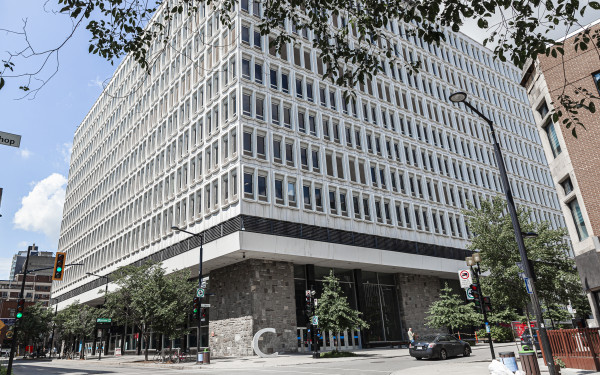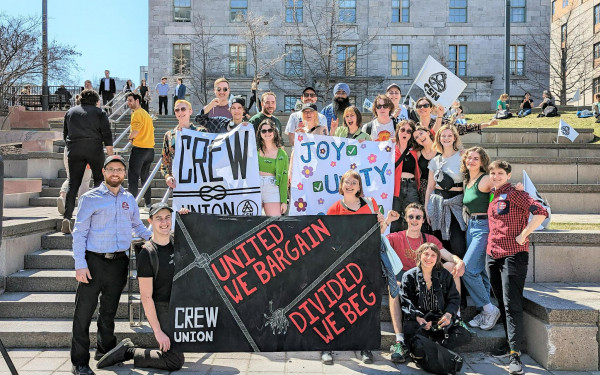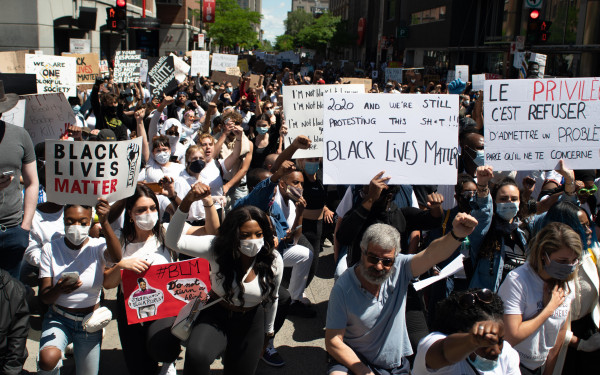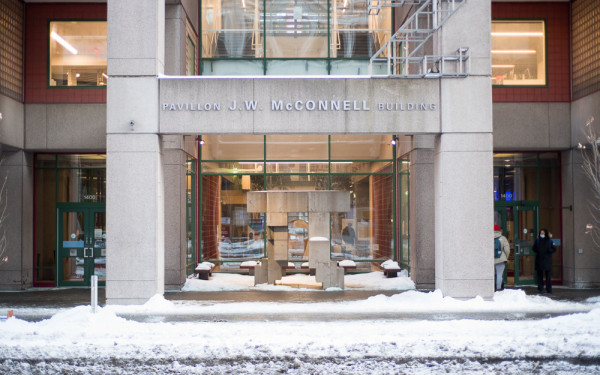TRAC members rally against sexual harassment at Concordia
Teaching and research assistants draw attention to the issue on International Women’s Day
To mark this year’s International Women’s Day, Teaching and Research Assistants at Concordia gathered in front of the Nathan Bethune Statue to protest sexual harassment issues at Concordia University on Tuesday, March 8.
The protest saw around 40 teaching and research assistants, as well as their allies, march along De Maisonneuve Boulevard on the Sir George Williams campus, carrying signs that read “mismanaged complaints = angry TAs” and “how many accusations do you need?”.
According to TRAC members, Concordia has failed to properly handle sexual harassment allegations over the years.
“Concordia has a long history of not adequately addressing when students or staff have been sexually harassed by their bosses or colleagues,” said Mya Walmsley, a first-year master’s philosophy student at Concordia.
This particular rally was directly connected to a campaign within the philosophy department, where a large majority of teaching and research assistants refused to work for an unnamed professor, who’s had several sexual harassment complaints logged against them. Late last year, over 250 teaching and research assistants signed a petition calling on the school to implement “a transparent student, survivor, and staff-led accountability process,” according to TRAC, to better address issues of sexual harassment within the institution.
“The importance of this campaign, created by members in the philosophy department, cannot be stressed enough,” said Bree Stuart, president of TRAC. “TRAC is actively putting resources towards fighting sexual harassment on campus and hoping to change Concordia's rules, as well as laws to make a safer space for everyone on campus.”
According to teaching assistants within the philosophy department, a safe space is sorely needed as they don’t feel that the faculty has their back.
“It’s created distrust in our department,'' said Nelson Graves, a first-year master’s philosophy student. “It’s been hard to feel connected to faculty members when you’re in proximity to someone like that.”
The current investigative process largely keeps the complainant in the dark, without centring the concerns and safety of the survivor. Instead, the accused faculty and colleagues often get to continue their work without any obvious disciplinary actions.
“Concordia has a long history of not adequately addressing when students or staff have been sexually harassed by their bosses or colleagues.” — Mya Walmsley
“We’re hoping for more student-led processes and more transparent processes, as well as institutional change,” said Graves. “I don’t think we as students should be tasked with dealing with all of this.”
According to Walmsley, for new master’s students within the philosophy program, learning that a professor they may work with has this history of sexual harassment allegations creates an unwelcoming environment.
“It was a very frightening introduction [to the university],” said Walmsley, who moved to Montreal from Australia to pursue their degree. “It makes you feel small, it makes you feel afraid, especially being in a country where you’ve never been before and you already feel threatened.”
But these issues are not isolated to just the philosophy department—complaints from the creative writing and english programs have also been swept under the rug, dating as far back as the ‘90s.
“If you go on Google and type in Concordia sexual harassment, so much comes up from so many different departments,” said Graves.
Between 2012 and 2018, six former Concordia students filed complaints with the Quebec Human Rights Commission, saying the university does not properly address these accusations.
Walmsley pointed out that while TAs are students, they are also teachers and workers within the school, making this both a labour issue and students-right issue.
International Women’s Day historically has ties to the labour movement and women’s movement, having been born out of the women’s suffrage movement in the early 20th century. While the day is meant to uplift the achievements of women, it has always been a day to address the many inequities that women in the workforce continue to face.
People of all genders can experience sexual harassment in the workplace, but it is mostly women who take on this burden. According to a Statistics Canada report, one in four women have experienced workplace sexual harassment.
Because of this, TRAC decided that this year’s International Women’s Day was the perfect opportunity to bring this issue to the forefront. While this is the first year that this rally has taken place on International Women’s Day, Walmsley said it could become an annual event if Concordia continues to inadequately handle sexual harassment complaints.
“Even if it’s not public, this is happening across the university,” said Walmsley. “People don’t feel that they have the power to stand up.”
Walmsley said that this year’s cohort decided that enough was enough. The teaching and research assistants within the philosophy department wanted to take matters into their own hands by putting a working ban on the accused professor, refusing to work with them. They hope that the university will see this action as a reason to take these concerns seriously.
Walmsley and Graves both said they have yet to receive any official response on this matter from faculty at Concordia.
“We wanted to show to the university administration that we’re going to be here fighting, not just in our department and not just against sexual harassment, but all forms of oppression within the university,” said Walmsley. “We’re going to use our power as workers to fight.”






